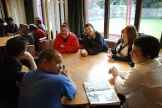Social Skills Groups and Autism
Ranking:

 Social skills groups are designed to provide an opportunity for autistic people to practice and improve their social skills in a safe, supportive and structured environment.
Social skills groups are designed to provide an opportunity for autistic people to practice and improve their social skills in a safe, supportive and structured environment.
Social skills groups meet on a regular basis and are usually facilitated by a professional.
Some groups consist only of autistic people although some may also include non-autistic people who are there to demonstrate appropriate social skills.
A social skills group session typically includes a structured lesson on a specific skill, demonstration of the skill, role playing with rehearsal/practice of the skill, discussion, and individualised performance feedback.
Social skills groups differ from social groups in that they are more focussed on the attainment of skills and are therefore likely to be more structured.
Our Opinion
There is a considerable amount of strong positive evidence to suggest that social skills groups may help some autistic children and young people practice and improve a range of social skills. There is much less evidence for any benefit for autistic.
Social skills groups are most likely to benefit autistic children and young people with average or above average IQ and with existing language skills. They may also be most appropriate for children and young people who actively wish to socialise and whose anxiety levels and behaviour are manageable in situations that involve several people at once.
However care should be taken to teach practical skills that children and young people actually want rather than abstract social refinements that other people think autistic people should have. Autistic children and young people should be taught multiple skills in situations that reflect real experiences and real settings as this is likely to be of more value to them than being taught isolated skills out of context.
There is a need for more research involving larger, controlled studies of social skills training groups. These should seek to differentiate more clearly between the different types of social skills groups and the different elements within each programme, should investigate socially relevant and useful skills in realistic settings, and should include adults as well as children and young people.
Disclaimer
Please read our Disclaimer on Autism Interventions
- Updated
- 17 Jun 2022
- Last Review
- 01 Feb 2016
- Next Review
- 01 Sep 2022

